Maintaining a healthy lifestyle is essential for everyone, but it becomes especially important for individuals with limited mobility. Balanced nutrition and tailored fitness routines not only improve physical health but also boost mental well-being, energy levels, and overall quality of life. However, traditional fitness and dietary advice often overlook the unique challenges faced by those with limited mobility.
This article aims to provide practical and inclusive nutrition and fitness tips specifically designed for individuals with mobility restrictions. By addressing the physical, emotional, and logistical aspects of maintaining a healthy lifestyle, it offers actionable strategies to help you feel your best every day.
The Importance of Nutrition for Individuals with Limited Mobility
Good nutrition is the cornerstone of a healthy lifestyle, but for individuals with limited mobility, it holds even greater significance. A well-balanced diet supports overall health, prevents unnecessary weight gain, and provides the energy needed to engage in physical activity.
Managing Weight and Energy Levels
Limited mobility can sometimes lead to reduced physical activity, which affects how the body uses and stores calories. Maintaining a healthy weight becomes crucial to avoid placing extra stress on joints, muscles, or prosthetic devices.
Focusing on nutrient-dense foods is an effective strategy. Foods rich in vitamins, minerals, and fiber provide the body with essential nutrients without excess calories. For example, replacing processed snacks with fresh fruits, vegetables, and whole grains can help regulate energy levels and promote overall health.
At the same time, it’s important to ensure that meals are well-balanced. Including lean proteins, healthy fats, and complex carbohydrates in every meal supports sustained energy and muscle maintenance. For individuals using assistive devices or prosthetics, muscle strength is especially important to support mobility and prevent strain.
Supporting Bone and Joint Health
For individuals with limited mobility, the health of bones and joints is particularly important. A diet rich in calcium, vitamin D, and magnesium helps maintain bone density and prevent conditions like osteoporosis.
Incorporating foods such as dairy products, fortified plant-based milks, leafy greens, and nuts ensures adequate intake of these nutrients. Additionally, consulting with a healthcare provider about supplements can help fill nutritional gaps if dietary sources are insufficient.
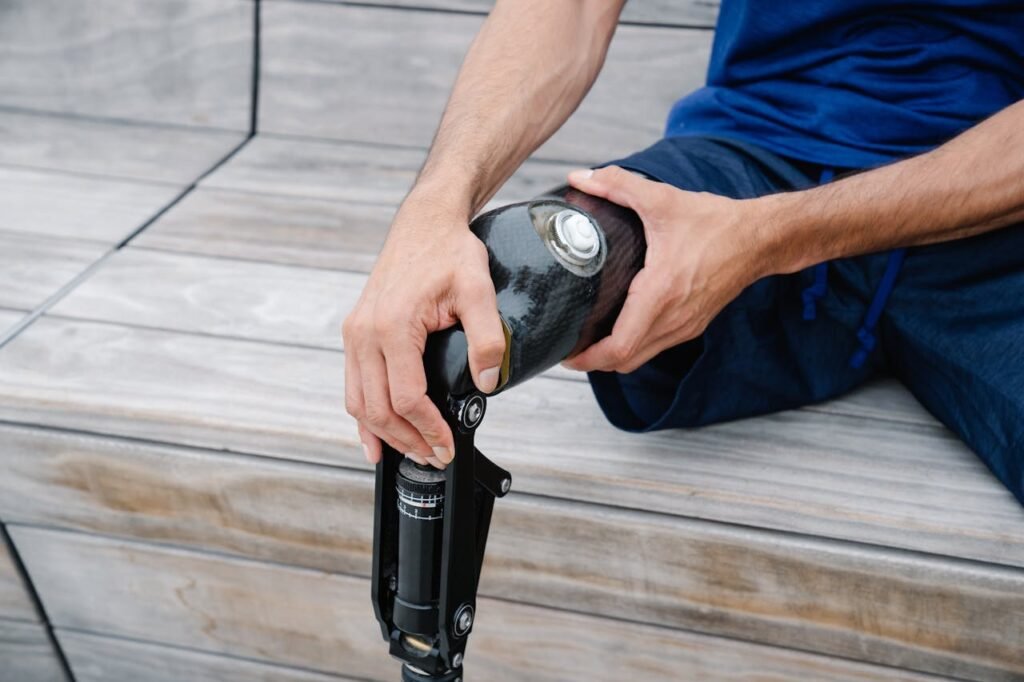
Fitness Approaches Tailored to Limited Mobility
Fitness routines often focus on traditional exercises, which may not be suitable for individuals with mobility restrictions. However, physical activity remains vital for maintaining strength, flexibility, and cardiovascular health. Adapting workouts to fit individual needs ensures that everyone can benefit from regular exercise.
Seated and Low-Impact Exercises
Seated exercises provide a safe and effective way to stay active, especially for those with mobility challenges. These exercises target various muscle groups, improve circulation, and enhance flexibility without requiring significant movement or balance.
For example, seated strength training using resistance bands or light weights can build muscle without putting stress on joints. Chair yoga is another excellent option, promoting relaxation and improving range of motion through gentle stretching.
Low-impact exercises, such as water-based activities or hand cycling, are also beneficial. These workouts reduce strain on joints while providing cardiovascular benefits. Exploring adaptive sports can be an exciting way to combine fitness with social interaction and enjoyment.
Prioritizing Core Strength
The core muscles play a critical role in stability and movement, especially for individuals using assistive devices or prosthetics. Strengthening the core enhances balance, reduces the risk of falls, and supports proper posture.
Simple exercises like seated abdominal crunches, oblique twists, or stability ball workouts can effectively engage core muscles. Incorporating these exercises into a routine helps improve overall functional mobility and reduces discomfort caused by poor alignment.
Overcoming Barriers to Fitness
For individuals with limited mobility, the path to fitness can be accompanied by unique challenges. Recognizing these barriers and finding solutions can make physical activity more accessible and enjoyable.
Addressing Pain and Discomfort
Pain or discomfort can discourage regular exercise, especially for those with joint issues or other physical limitations. Adapting workouts to minimize strain while maximizing benefits is essential.
Low-resistance exercises, such as aquatic therapy or stretching routines, can alleviate discomfort while building strength and flexibility. Additionally, working with a physical therapist or fitness trainer experienced in adaptive exercise can help identify movements that are both safe and effective.
For instance, gentle stretching before and after exercise can reduce stiffness and improve mobility. Applying heat to sore muscles before a workout or using cold therapy afterward can further enhance comfort and recovery.
Making Fitness a Habit
Consistency is key to reaping the benefits of physical activity, but staying motivated can be challenging. Creating a structured routine with realistic goals ensures that fitness becomes a sustainable part of daily life.
Setting specific, achievable objectives—such as completing a certain number of seated exercises or attending weekly yoga sessions—helps track progress and build momentum. Celebrating small milestones reinforces the positive impact of these efforts, encouraging continued commitment.
Incorporating fitness into social activities can also boost motivation. Joining adaptive sports leagues or participating in group classes designed for individuals with limited mobility fosters a sense of community and accountability.
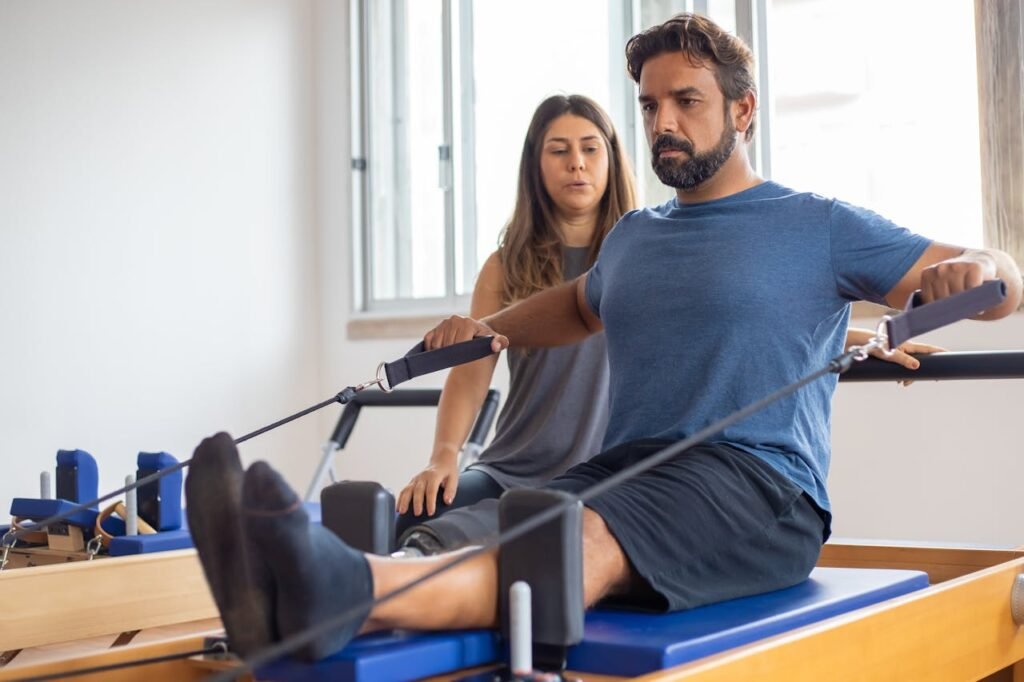
Emotional Benefits of Nutrition and Fitness
A healthy lifestyle extends beyond physical health—it profoundly impacts mental and emotional well-being. For individuals with limited mobility, the connection between nutrition, fitness, and mental health is particularly significant.
Boosting Mood Through Movement
Exercise stimulates the release of endorphins, often referred to as “feel-good” hormones. These natural chemicals enhance mood, reduce stress, and combat feelings of depression or anxiety. Even light physical activity, such as stretching or seated exercises, can trigger these benefits.
For example, a simple daily routine of arm exercises or gentle yoga can improve circulation and elevate energy levels. Over time, the consistent release of endorphins fosters a positive outlook and enhances emotional resilience.
Businesses and organizations that support adaptive fitness programs for their employees or communities can contribute to widespread mental health benefits. Providing access to resources, trainers, or wellness classes creates opportunities for individuals to experience the joy of movement.
The Role of Nutrition in Mental Clarity
What we eat affects how we feel—not just physically but emotionally as well. A diet rich in whole foods, such as fruits, vegetables, and lean proteins, provides the nutrients necessary for brain health and emotional stability.
For individuals with limited mobility, prioritizing foods with anti-inflammatory properties—such as fatty fish, nuts, and berries—can reduce inflammation that may contribute to pain or discomfort. At the same time, staying hydrated and limiting processed foods helps maintain energy levels and focus.
Incorporating mindfulness into meals, such as savoring each bite and avoiding distractions, can transform eating into a calming and enjoyable experience. This practice encourages a deeper connection with food and its role in supporting overall well-being.
Tailoring a Nutritional Plan for Limited Mobility
A personalized approach to nutrition ensures that individuals with limited mobility meet their unique dietary needs. This not only supports overall health but also addresses specific challenges associated with reduced physical activity or chronic conditions.
Balancing Calorie Intake and Energy Expenditure
For individuals with limited mobility, balancing calorie intake with energy expenditure is critical to maintaining a healthy weight. While physical activity may be reduced, metabolism and nutritional requirements remain active.

Focus on nutrient-dense foods that provide essential vitamins and minerals without excess calories. For example, incorporating vegetables like spinach, broccoli, and sweet potatoes ensures a supply of nutrients while supporting satiety. Healthy fats, such as those found in avocados and olive oil, provide energy and promote heart health.
Meal planning plays a vital role in achieving this balance. Preparing meals in advance reduces the temptation to rely on processed or calorie-dense options and ensures consistent portion sizes. Consulting a nutritionist for tailored meal plans can further optimize dietary choices.
Managing Common Nutritional Deficiencies
Individuals with limited mobility may face a higher risk of certain nutritional deficiencies, such as vitamin D, due to reduced sun exposure or calcium, which supports bone health. Addressing these potential gaps is essential to prevent long-term complications.
Including fortified foods, dairy alternatives, or supplements in the diet can help maintain adequate levels of these nutrients. Regular blood tests to monitor nutritional status provide actionable insights for making dietary adjustments as needed.
Hydration is another critical aspect of nutrition that is often overlooked. Adequate water intake supports digestion, circulation, and joint lubrication. Herbal teas or water infused with fruits can make hydration more enjoyable, especially for those who struggle to drink plain water.
Adapting Fitness to Changing Needs
Physical activity requirements can change over time due to factors such as age, health conditions, or new physical limitations. Adapting fitness routines ensures that individuals continue to reap the benefits of exercise while respecting their current capabilities.
Exploring Technology-Driven Fitness
Technology has revolutionized fitness, making it more accessible for individuals with limited mobility. Apps, wearable devices, and virtual classes tailored to adaptive exercise provide opportunities to stay active at home or in community spaces.
For instance, fitness apps designed for seated workouts or rehabilitation exercises offer guided routines that cater to specific mobility needs. Some apps even track progress, helping users stay motivated and monitor their achievements.
Virtual classes create opportunities for social interaction and community building while promoting consistent participation. Many organizations now offer live-streamed sessions led by trainers experienced in adaptive fitness.

Partnering With Healthcare Professionals
Regular consultations with physical therapists or fitness experts ensure that exercise routines remain safe and effective. These professionals can design customized programs that accommodate individual needs while targeting specific health goals.
For example, a physical therapist might recommend resistance band exercises to strengthen muscles without causing strain or suggest balance training to improve coordination. Periodic evaluations allow for adjustments to routines, ensuring continued progress and preventing plateaus.
For businesses and organizations, offering wellness programs that include professional guidance, such as on-site therapy sessions or fitness workshops, fosters a supportive environment and encourages participation.
Creating a Supportive Environment for Health and Wellness
A supportive environment is crucial for individuals with limited mobility to successfully adopt and maintain healthy nutrition and fitness habits. This includes fostering connections with family, friends, and community resources, as well as adapting the physical space to meet unique needs.
Building a Strong Support Network
Social connections play a significant role in maintaining motivation and accountability. Family members, friends, and caregivers can provide encouragement, assistance, and companionship on the journey toward better health.
For example, cooking meals together creates an opportunity to bond while exploring new, healthy recipes. Similarly, participating in exercise routines as a group—whether it’s seated yoga or a walk in the park—promotes mutual encouragement and shared enjoyment.
Joining local or online communities focused on adaptive fitness or healthy living also offers valuable support. These groups often share resources, success stories, and practical tips, creating a sense of belonging and shared purpose. Businesses that partner with such communities can enhance their outreach and support individuals in achieving their health goals.
Modifying the Home Environment
The physical environment plays a crucial role in supporting a healthy lifestyle. Simple modifications can make it easier to prepare nutritious meals, engage in fitness routines, and maintain overall wellness.
For instance, ensuring that kitchen tools are easily accessible and ergonomic can simplify meal preparation for individuals with mobility challenges. Sit-to-stand desks or adaptable furniture can create comfortable spaces for exercise or stretching at home.
Assistive devices, such as grab bars or non-slip mats, enhance safety during physical activity, especially for those incorporating standing or balance exercises into their routines. Consulting with occupational therapists to optimize home layouts ensures that the space promotes independence and well-being.
Businesses involved in home design or adaptive technology can play a role by offering products and services tailored to these needs. Highlighting these offerings through accessible marketing materials ensures they reach the individuals who would benefit most.
Incorporating Technology for Accessibility
Technology plays a crucial role in creating a supportive environment for individuals with limited mobility. Innovations such as voice-activated devices, adaptive fitness apps, and online nutrition planners provide tools to make health and wellness routines more accessible and manageable.
For example, a voice-controlled smart assistant can help individuals set reminders for hydration, meal preparation, or fitness sessions. Adaptive fitness apps featuring customizable workouts for seated or low-impact exercises ensure that everyone can engage in physical activity, regardless of their mobility level.
Similarly, online platforms that track nutrition intake and provide feedback on dietary choices help users make informed decisions.
Organizations involved in wellness technology can further enhance accessibility by integrating inclusive design principles. Ensuring compatibility with screen readers, offering multiple language options, and providing clear instructions are actionable strategies to reach a diverse audience.
Companies that prioritize accessibility not only support their users but also position themselves as leaders in inclusive innovation.
Designing Physical Spaces for Wellness
A well-designed physical environment significantly impacts the ability of individuals with limited mobility to maintain health routines. Creating spaces that prioritize accessibility and functionality is essential for fostering independence and confidence in pursuing wellness goals.
For instance, adaptive kitchens equipped with pull-out shelves, lower countertops, and lightweight utensils make it easier to prepare healthy meals. In-home fitness spaces with supportive flooring, accessible storage for equipment, and ergonomic seating provide a safe and inviting area for exercise.
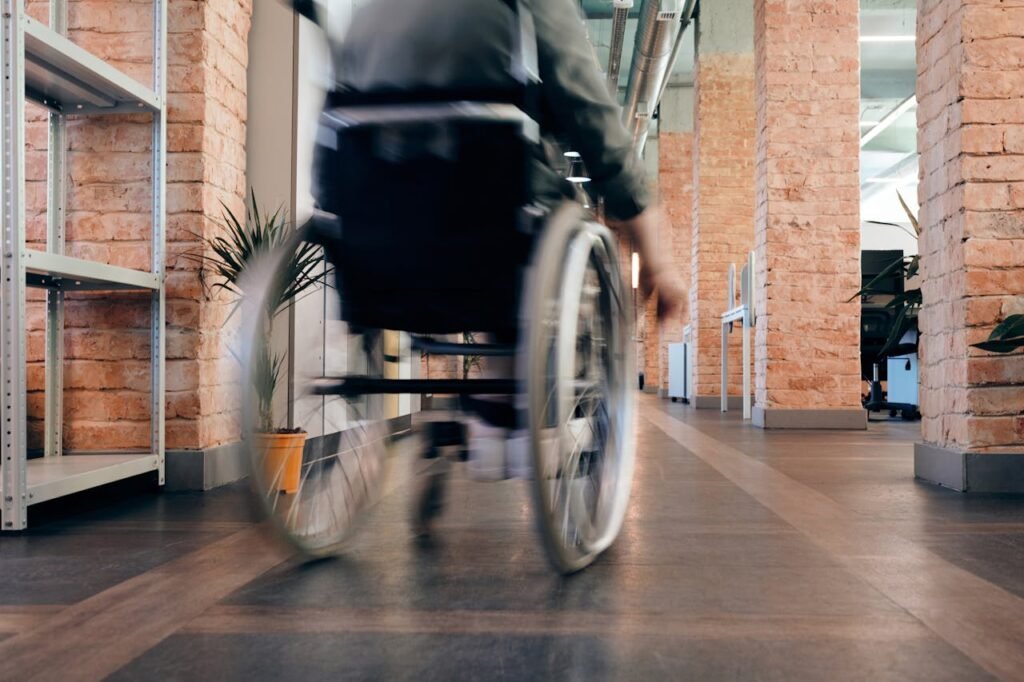
Encouraging Social Engagement
Social connections are a cornerstone of emotional and physical well-being, particularly for individuals navigating mobility challenges. Creating environments that foster interaction and mutual support encourages individuals to stay committed to their health and wellness goals.
Community centers, gyms, and organizations can host events or clubs specifically designed for people with limited mobility. Adaptive yoga classes, cooking demonstrations, or group discussions on nutrition provide opportunities for learning, interaction, and shared motivation.
Long-Term Benefits of Nutrition and Fitness
The rewards of maintaining good nutrition and regular fitness extend far beyond immediate physical improvements. Over time, these habits contribute to enhanced quality of life, emotional resilience, and increased independence.
Preventing Secondary Health Issues
For individuals with limited mobility, maintaining a healthy lifestyle reduces the risk of developing secondary health conditions, such as cardiovascular disease, diabetes, or muscle atrophy.
Consistent physical activity improves circulation, strengthens the heart, and supports metabolic health, while a balanced diet provides the nutrients necessary for long-term vitality.
For example, individuals who incorporate core-strengthening exercises into their routines often experience better posture, reduced back pain, and improved stability. Similarly, focusing on anti-inflammatory foods can alleviate joint discomfort and support mobility.
Employers and community organizations that promote these practices through wellness programs help individuals avoid preventable health issues, ultimately reducing healthcare costs and enhancing productivity.
Enhancing Mental and Emotional Well-Being
The connection between physical health and mental well-being is undeniable. Regular exercise and nutritious eating habits boost mood, reduce anxiety, and foster a sense of accomplishment. Over time, these positive changes create a ripple effect, improving self-esteem and overall life satisfaction.
For instance, someone who sets small, achievable fitness goals and consistently meets them gains confidence in their abilities. This newfound self-assurance often extends to other areas of life, such as pursuing hobbies, relationships, or professional ambitions.
Organizations can amplify this impact by celebrating individual successes within their communities or workplaces. Recognizing efforts, no matter how small, reinforces the value of health and wellness initiatives and inspires others to follow suit.
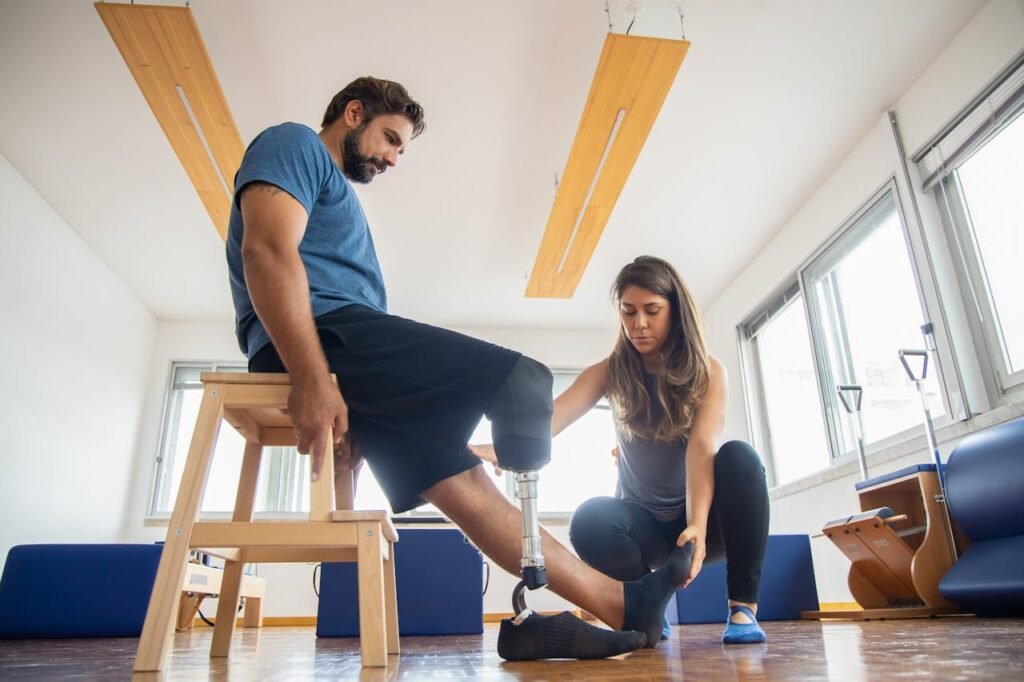
Improving Sleep Quality
One often-overlooked long-term benefit of proper nutrition and regular fitness is improved sleep quality. For individuals with limited mobility, disrupted sleep can significantly impact overall health, exacerbating issues such as fatigue, stress, and chronic pain.
Nutritional habits, such as reducing caffeine intake in the afternoon and prioritizing foods rich in magnesium and tryptophan, support better sleep cycles. These nutrients, found in foods like bananas, almonds, and turkey, help regulate melatonin production, promoting restful sleep.
Fitness routines also contribute to improved sleep by reducing stress and promoting physical relaxation. Gentle evening exercises, such as chair yoga or deep-breathing routines, prepare the body for restful sleep while minimizing stiffness or discomfort.
Enhancing Longevity and Quality of Life
One of the most significant long-term benefits of prioritizing nutrition and fitness is the potential to extend life expectancy while improving quality of life. For individuals with limited mobility, these practices empower them to live more active, fulfilling lives, even in the face of physical challenges.
A nutritious diet supports cellular repair, reduces inflammation, and prevents the onset of age-related diseases. Similarly, fitness routines tailored to an individual’s capabilities preserve muscle mass, enhance bone density, and improve cardiovascular health. Together, these habits contribute to a life that is not only longer but also more vibrant and independent.
For businesses, aligning with longevity-focused initiatives provides an opportunity to build brand loyalty among customers seeking proactive health solutions. Offering resources, tools, or services that emphasize long-term health benefits, such as adaptive fitness equipment or meal plans for specific health conditions, positions a company as a partner in its customers’ well-being journeys.
Conclusion
Nutrition and fitness are not just about physical health—they are integral to living a fulfilling and empowered life. For individuals with limited mobility, adopting tailored strategies ensures that they can enjoy the full benefits of a healthy lifestyle, from increased energy and strength to enhanced emotional resilience.
Creating supportive environments, leveraging adaptive tools, and fostering community connections are key to overcoming barriers and achieving long-term success. Whether through personal commitment or organizational initiatives, prioritizing health and wellness makes a meaningful difference in the lives of individuals and communities alike.
By embracing inclusivity and innovation, we can ensure that everyone has the opportunity to thrive, regardless of mobility challenges. It’s not just about what we can achieve today—it’s about building a foundation for a healthier, happier tomorrow.



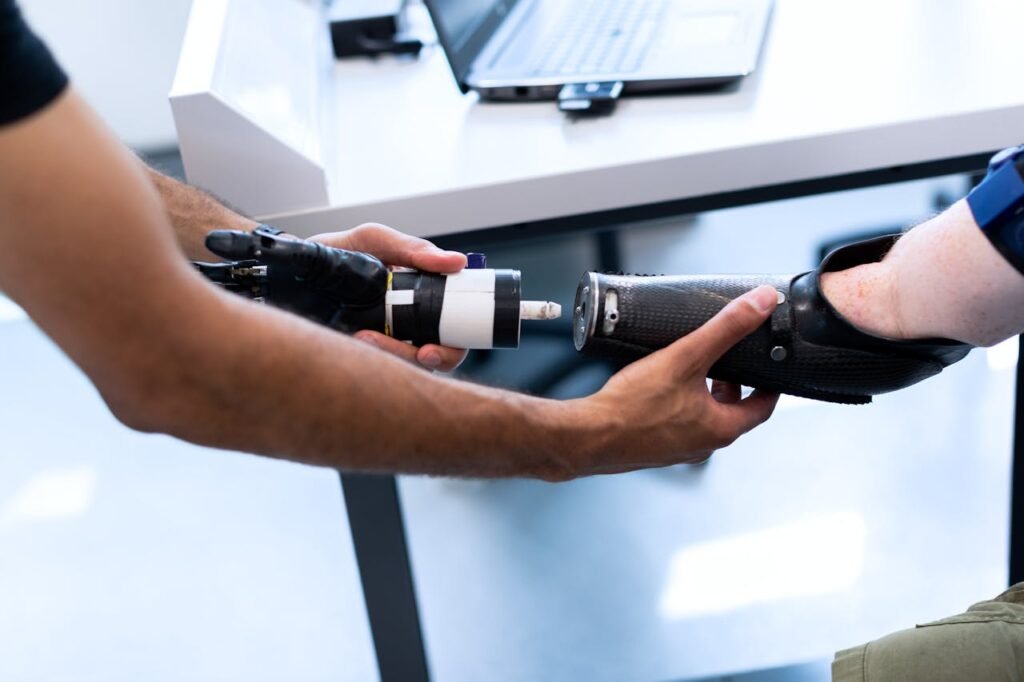
Great post! Really informative and well-explained. Appreciate the effort in breaking it down so clearly—definitely learned something new today!